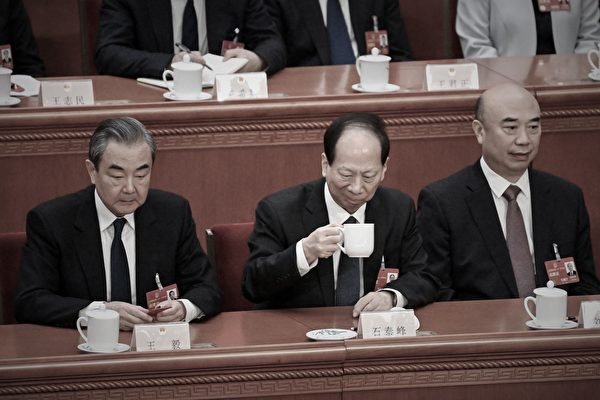In a rare move, there are reports indicating that a senior official of the Communist Party of China (CPC) is undergoing a significant reshuffle. The news suggests that Shì Tàifēng, Minister of the United Front Work Department of the CPC Central Committee, will be reassigned as Minister of the CPC Central Organization Department, while the former Minister of the Central Organization Department, Lǐ Gānjié, will take over as Minister of the United Front Work Department. Analysts believe that if the news is confirmed, it may signal a major shift in the CPC’s strategy towards Taiwan. The backgrounds of the two individuals from the Central Party School and Tsinghua University respectively also indicate potential internal power struggles within the CPC.
The pro-Beijing newspaper “Sing Tao Daily” reported today that the Politburo of the CPC held a meeting the day before yesterday, and the official media bulletin stated that the meeting “also discussed other matters,” which reportedly included the appointment exchange between the heads of the Central Organization Department and the United Front Work Department. Shì Tàifēng has been appointed as Minister of the CPC Central Organization Department, with the former Minister of the Central Organization Department, Lǐ Gānjié, taking the helm of the Central United Front Work Department. It is said that such a rare exchange of leaders between these two central departments is unprecedented.
The Central Organization Department, the Propaganda Department, and the United Front Work Department are the three major functional departments of the CPC Central Committee. The Central Organization Department is responsible for organizational and personnel management, overseeing the assessment and promotion of senior cadres, and is considered to wield the most actual power. The United Front Work Department is in charge of what is known as united front work within the CPC, often referred to as the largest espionage institution within the Party. United front work was proclaimed by Mao Zedong as the “first of the three magic weapons” with which the Communist Party could seize power. In 2018, the State Council Overseas Chinese Affairs Office, as well as the State Ethnic Affairs Commission and the State Religious Affairs Administration, were merged into the Central United Front Work Department, expanding the power of this department.
Both Shì Tàifēng and Lǐ Gānjié are members of the Central Political Bureau and Central Secretariat.
Shì Tàifēng, 68 years old, hails from Shanxi, graduated from Peking University Law School, and served at the Central Party School for 25 years, rising to the position of Deputy Principal. During the period when Xi Jinping concurrently served as the President of the Central Party School from 2007 to 2012, Shì was his deputy. Shì Tàifēng later held positions such as Secretary of the Suzhou Municipal Party Committee of Jiangsu Province, Governor of Jiangsu Province, Party Secretary of Ningxia Hui Autonomous Region, Party Secretary of Inner Mongolia Autonomous Region, and President of the Chinese Academy of Social Sciences. He entered the Political Bureau at the 20th Party Congress and was appointed as Minister of the United Front Work Department, while also serving as the First Vice Chairman of the National People’s Political Consultative Conference.
Lǐ Gānjié, 60 years old this year, is from Hunan, graduated from Tsinghua University and is a nuclear expert. He worked for a long time at the CPC Ministry of Ecology and Environment and held positions as Deputy Minister as well as Director of the National Nuclear Safety Administration. In 2016, he served as Deputy Secretary of the Hebei Provincial Party Committee, and a year later became the Minister of the CPC Ministry of Ecology and Environment. Subsequently, he became the Minister of the restructured Ministry of Ecology and Environment, then was transferred to Shandong as Governor and Party Secretary. He entered the Political Bureau at the 20th Party Congress, succeeding Chén Xī as Minister of the Central Organization Department.
Commentator Lǐ Lín stated to World Journal that if the news of the exchange of heads between the Central Organization Department and the United Front Work Department is confirmed, it indicates a significant change in the CPC’s Taiwan strategy.
He pointed out that starting from 2022, in addition to serving as the Minister of the United Front Work Department, Shì Tàifēng also concurrently held the position of Vice Chairman of the National People’s Political Consultative Conference and ranked second in the Central Secretariat (following Cài Qí). His authority was substantial. Looking back now, the arrangements for Wáng Hùníng, Shì Tàifēng, and Sòng Tāo highlight Xi Jinping’s desire to lay the foundation for the so-called “peaceful reunification” with Taiwan through bribery, infiltration, and division. However, Taiwan has recently launched a strong counterattack against the CPC’s infiltration efforts, thwarting the original plans of the CPC. If even the orchestrator of the “peaceful reunification,” Shì Tàifēng, is reassigned, the future CPC strategy towards Taiwan may undergo significant changes. The next focus will be whether the 70-year-old Sòng Tāo will be reassigned.
However, Lǐ Lín also noted that although the Central Organization Department holds the most actual power, Lǐ Gānjié may have a challenging time in the position of Minister of the Central Organization Department. Lǐ Gānjié belongs to the category of technical bureaucrats, and while he and his predecessor in the Central Organization Department, Chén Xī, both graduated from Tsinghua University, it seems that his relationship with Xi is not as close, making it difficult for him to handle personnel matters. If he were to be in charge of the United Front Work Department as well, it might just be a symbolic position. If this adjustment is confirmed, it may also reflect internal struggles within Xi’s camp, indicating a power struggle at the highest levels, with Shì Tàifēng’s faction from the Central Party School appearing stronger compared to Lǐ Gānjié’s Tsinghua University background.

